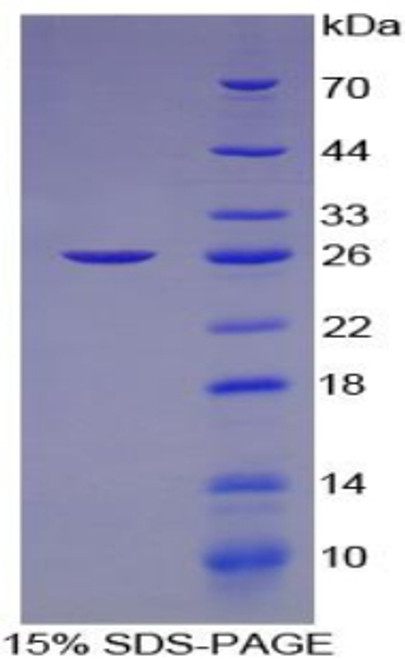Product Description
Chicken Microtubule-associated protein 6 (MAP6) ELISA Kit | AE60499CH | Abebio
Species Reactivity: Chicken (Gallus)
Abbreviation: MAP6
Alternative Name: FLJ41346; KIAA1878; MTAP6; N-STOP; STOP; stable tubule-only polypeptide
Application: ELISA
Range: 0.312-20 ng/mL
Sensitivity: 0.101 ng/mL
Intra-Assay: ≤4.2%
Inter-Assay: ≤7.7%
Recovery: 0, 99
Sample Type: Serum, Plasma, Other biological fluids
Detection Method: Sandwich
Analysis Method : Quantitive
Test Principale: This assay employs a two-site sandwich ELISA to quantitate MAP6 in samples. An antibody specific for MAP6 has been pre-coated onto a microplate. Standards and samples are pipetted into the wells and anyMAP6 present is bound by the immobilized antibody. After removing any unbound substances, a biotin-conjugated antibody specific for MAP6 is added to the wells. After washing, Streptavidin conjugated Horseradish Peroxidase (HRP) is added to the wells. Following a wash to remove any unbound avidin-enzyme reagent, a substrate solution is added to the wells and color develops in proportion to the amount of MAP6 bound in the initial step. The color development is stopped and the intensity of the color is measured.
Product Overview: Microtubule-associated protein 6 is a microtubule-associated protein. It is calmodulin-binding and calmodulin-regulated protein that is involved in microtubule stabilization. Two transcript variants encoding distinct isoforms have been identified for this gene.Mammalian cells often contain abundant subpopulations of microtubules that are stable to both drug- and cold temperature-induced disassembly. Such microtubules are apparently universal in the neurite extensions of neuronal cells. The protein, called stable tubule-only polypeptide (STOP) by them, is a 100.5-kD polypeptide. The central region of the predicted 952-amino acid polypeptide contains 5 tandem repeats of 46 amino acids. STOP also contains a putative SH3-binding motif near its N terminus.
Stability: The stability of ELISA kit is determined by the loss rate of activity. The loss rate of this kit is less than 5% within the expiration date under appropriate storage condition. The loss rate was determined by accelerated thermal degradation test. Keep the kit at 37°C for 4 and 7 days, and compare O.D.values of the kit kept at 37°C with that of at recommended temperature. (referring from China Biological Products Standard, which was calculated by the Arrhenius equation. For ELISA kit, 4 days storage at 37°C can be considered as 6 months at 2 - 8°C, which means 7 days at 37°C equaling 12 months at 2 - 8°C) .
 Euro
Euro
 USD
USD
 British Pound
British Pound
 NULL
NULL












